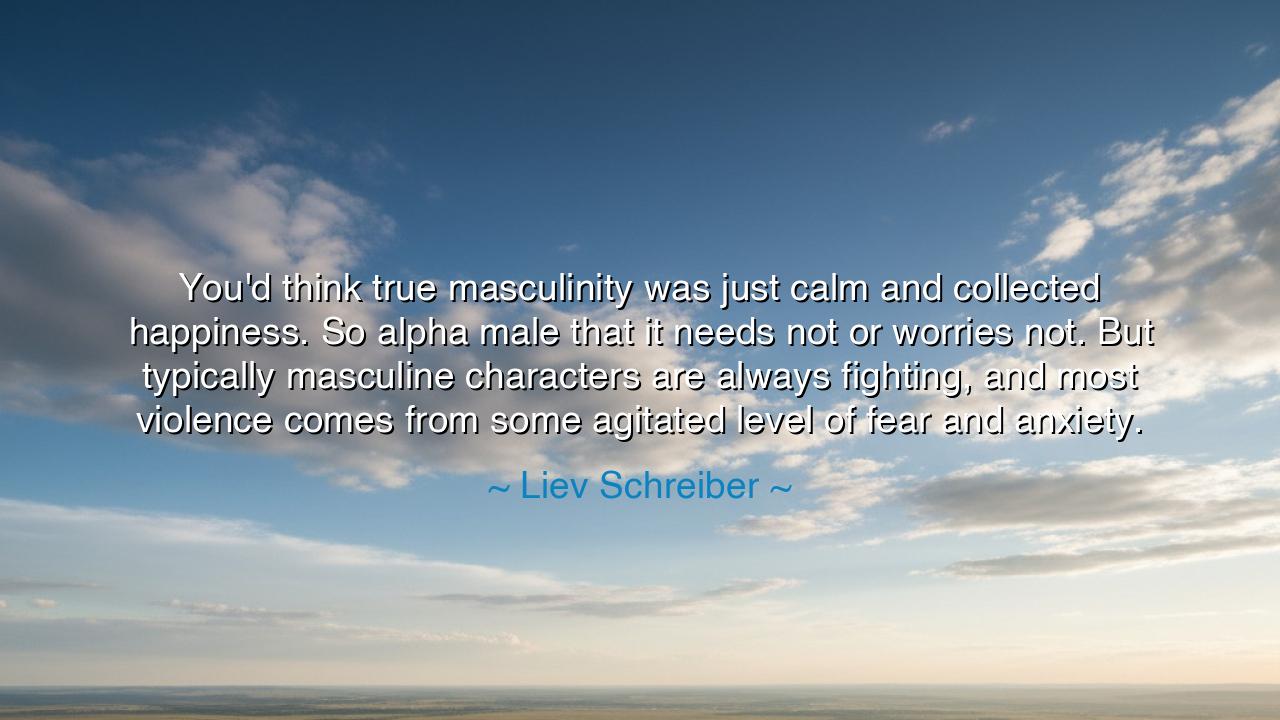
You'd think true masculinity was just calm and collected
You'd think true masculinity was just calm and collected happiness. So alpha male that it needs not or worries not. But typically masculine characters are always fighting, and most violence comes from some agitated level of fear and anxiety.






The words of Liev Schreiber, “You’d think true masculinity was just calm and collected happiness. So alpha male that it needs not or worries not. But typically masculine characters are always fighting, and most violence comes from some agitated level of fear and anxiety,” shine like a mirror held before the modern soul of man. In this reflection, Schreiber uncovers a paradox as ancient as humanity itself: that what we call masculinity is often not strength, but struggle; not peace, but turmoil. The world praises the image of the calm, powerful man—the alpha male, unshaken by doubt, unbothered by fear. Yet, in truth, many men live in inner conflict, their fury born not from courage but from fear and anxiety, their violence a desperate attempt to silence the trembling within.
In the wisdom of the ancients, true strength was never measured by conquest alone. The heroes of old, from Achilles to Gilgamesh, were men of passion, but also of torment. Their rage was the thundercloud hiding the storm of their own insecurity. Achilles, the mightiest warrior of Greece, was undone not by his enemies but by his own wrath—the fear of dishonor, the anxiety of mortality. In his fury, he killed, and in his grief, he wept. So too, Schreiber points to the truth that lies behind the façade of masculine violence: beneath the clenched fist beats a heart afraid of weakness, afraid of not being enough.
In our modern age, the mask of the alpha male still haunts the hearts of men. Society tells them they must not cry, must not falter, must always win. They are taught that emotion is a flaw, that tenderness is unmanly. And so they fight—not only with others, but with themselves. This endless battle breeds anxiety, and from anxiety springs aggression. The man who cannot bear to feel becomes the man who must dominate, for domination feels safer than vulnerability. Yet Schreiber’s insight reminds us that the highest form of masculinity is not dominance, but mastery—not of others, but of the self.
Consider the life of Marcus Aurelius, the philosopher-king of Rome. Surrounded by war and betrayal, he ruled not with the rage of conquest, but with the serenity of reason. His Meditations are not the words of an emperor boasting of power, but of a man wrestling with his own fear and doubt. He wrote, “You have power over your mind—not outside events. Realize this, and you will find strength.” Here lies the same truth Schreiber echoes: that true masculinity is calm because it has conquered inner chaos. It is not the roar of the lion that makes him king, but his command of the wilderness within.
Violence, whether in word or in act, is often the child of fear. The one who strikes first is usually the one who dreads being struck. The one who shouts loudest is often the one most desperate to drown out his own insecurity. It is a tragic irony of men through the ages that those most praised for their bravery are often those most tormented by the need to prove it. Schreiber’s words, stripped of pretense, invite men to a different kind of heroism: the courage to face themselves, to admit their fears, and to find peace not through domination, but through understanding.
This understanding is not weakness—it is liberation. When a man ceases to fight his own emotions, he becomes free from the endless cycle of violence and shame. He learns that true power is gentleness under pressure, that true confidence is born not from suppression, but from balance. The man who can acknowledge his anxiety without letting it rule him becomes the very image of the strength he once pretended to have. He no longer needs to be feared, because he has learned to be whole.
Let this be the lesson, then, passed down as ancient counsel to the sons of tomorrow: masculinity is not the denial of fear, but the courage to walk through it. The warrior who knows peace within himself no longer seeks war without. Be not the man who fights to hide his pain; be the man who heals it. Seek calmness as your victory, and compassion as your crown. For the strongest man is not the one who never trembles, but the one who, trembling, still stands with kindness.
So, dear listener, remember Schreiber’s wisdom: the storm of fear may rage within, but let your peace be stronger. Do not chase the hollow mask of the alpha, but the deep serenity of the sage. For when the heart is calm, there is no need to conquer, and when the soul is content, there is no fear to fight. This is the true masculinity—not of muscle or might, but of mind and mercy. It is the strength that brings light instead of war, and in that quiet strength, man rediscovers his noblest self.






AAdministratorAdministrator
Welcome, honored guests. Please leave a comment, we will respond soon